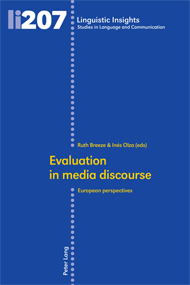The assessment in the speech traditional and online media, the focus of an ICS book
Peter Lang, the sixth best academic publishing house in the world, has published 'Evaluation in average Discourse', which analyzes media discourses from Spain, UK, USA, Netherlands and Germany.

Researchers Inés Olza and Ruth Breeze, from the project 'Public discourse' of the Institute for Culture and Societyhave edited a book that analyzes and compares how different media evaluate and assess in their discourse. The Issue, graduate Evaluation in average Discourse, has been published by publishing house Peter Lang, the sixth best publishing house in the world according to the Scholarly Publishers Indicators (SPI).
According to the authors, the media's speech is not only made up of the messages sent to readers, listeners or viewers, but it is also a social phenomenon that affects the way people see the world. "The goal of the book is to analyze the strategies of assessment (i.e., of evaluation or expression of subjectivity) present in the media," explained Olza.
The book has the participation of several researchers from other Spanish and foreign centers and universities. The authors develop tools to address the assessment and evaluation that takes place in the speech of the media and compare the speech traditional and digital.
Throughout eight chapters, they analyze media discourses in Spain, the UK, the US, the Netherlands and Germany. They also study 'unofficial' discourses, i.e., those created by users and bloggers, or comments in newspapers that may have the same repercussion as the messages launched by the media.
As Breeze and Olza explain in the introduction, with their research they wanted to understand how they had changed "the nature of media languages (formality, informality, discourses on group and outside group)" and "the nature of what can actually be described as a media speech (the discourses of social networks, of 'official' media, of forums and multimodal communications)."
Evaluation in average Discourse is part of the project FFI2012-3639 of the Ministry of Economics and Competitiveness (project 'Metadiscourse and evaluative language: theoretical perspectives and analysis in the journalistic speech ').
Chapters and authorsIntroduction, Ruth Breeze and Inés Olza.
Stancetaking and inter/subjectivity in journalistic discourse: The Engagement system revisited, Juana I. Marín-Arrese.
3. Concession in evaluative argumentative discourse: The semantics, pragmatics and discourse functions of but and although, María de los Ángeles Gómez González.
4. Evaluation in the headlines of tabloids and broadsheets: A comparative study, Laura Alba-Juez.
5. Negotiating futures in partner-technical controversies in the average: strategies of opinion orientation, Paola Catenaccio.
6. The banality of evil. A study about translating "los desaparecidos" in the German and English press, Frank J. Harslem.
7. "A life well lived of a lady well loved": The power of appraisal in the comments section, Isabel Corona.
8. The evaluative potential of colonial metaphor scenarios in (written) average representations of Spain's economic expansion. Spanish investors as forceful aggressors or audacious pioneers, Jasper Vandenberghe.
9. Re-articulating critical awareness about racism in public discourse: Changing one's mind on the Black Pete debates in the Netherlands, Jan Zienkowski.
